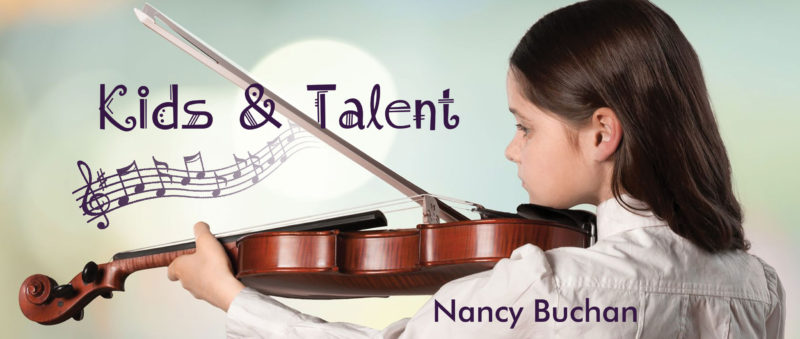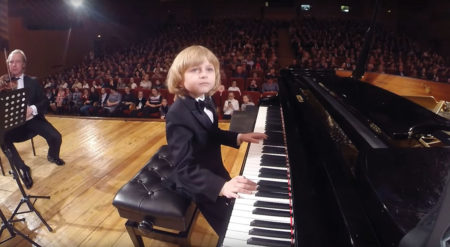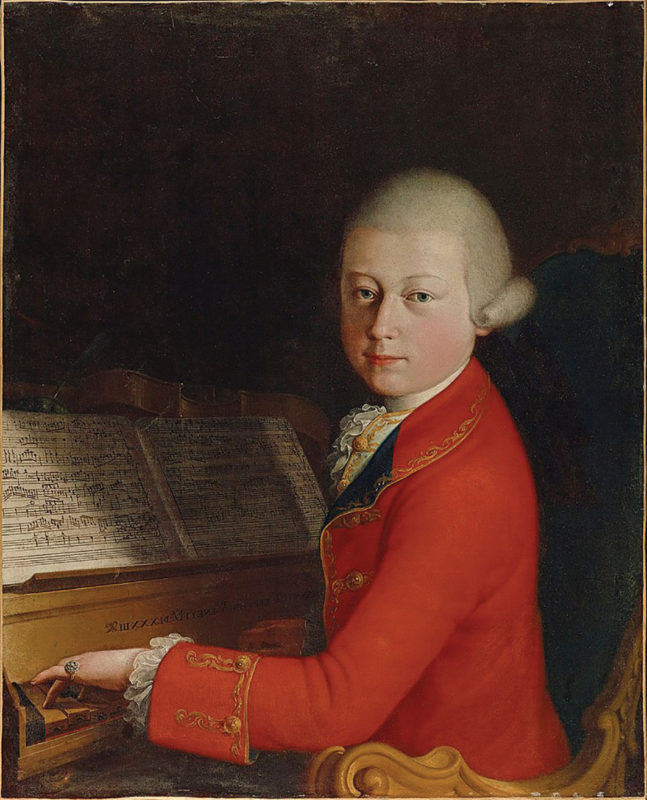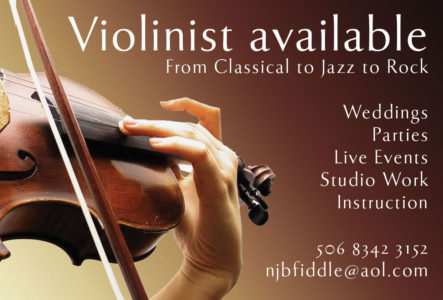Kids & Talent

No more goofing off! It’s the time of year when kids here go back to school and I go into teacher mode with a whole new batch of potential violinists to mess with! We’ve all been on vacation, and it’s always interesting to me to see which kids have returned, which ones clearly have been practicing, who the new kids are, and who switched over to saxophone while I wasn’t looking. There is an inevitable question that parents or other interested folks are just dying to ask me, and which I dread having to answer. “Does this kid have any talent?”
Sometimes the answer is so obvious that I can’t believe they even bother to ask it, but that is usually when the answer is a firm NO. If a kid can’t hear the difference between low or high notes, or shows no interest in understanding rhythm or doesn’t even like any songs, well, the answer is probably a firm NO. I understand fully the parental need to validate the expenses involved, and to justify their high hopes for their kids’ musical future, and who the heck am I anyway to put some judgment on a child’s potential or innate ability? What kind of jerk would I be if I casually dashed the hopes of a family who have scrimped and sacrificed to buy their child a violin and the accompanying lessons? I’ve found it is pretty difficult to predict how far a focused and determined child can take their talent. Parents want someone to tell them whether their kid is freaky because they are super talented or whether they are just freaky… Thinking about the elusive term ‘talent’ started me wondering what it really is, and what the difference is between a talented kid and a musical prodigy.
 Well, it seems the super smart child psychologist types aren’t really sure either. Most of them can’t agree on the age when a child can be called a prodigy. One article I read said a prodigy is typically a child under 15 who at an early age mastered the skills of playing at what is normally considered an adult level. Another expert claims that a kid under 13 who is ‘abnormally’ good at performing and composing music is a prodigy, and yet another said a prodigy is clearly recognizable by age 10. Toddlers who notice when music is off-key or who remember melodies or who can imitate a pitch precisely are said to be ‘gifted’. Frankly I think determination, persistence, and motivation are what set a so-called prodigy apart from other kids of the same age. Maybe physical aptitude plays a part. Certainly exposure to all types of music, especially more challenging classical music, is a big factor, as well as access to instruction and decent instruments. Strong parental support and structured practice sessions will make a huge difference in how fast a kid learns. If some inner city kid or one from an isolated rural situation never sees a flute, or hears the sound of a viola, then whether they have talent or not is kind of immaterial. But if a kid is taken to concerts, or the radio is playing something other than rap, maybe they will get some exposure to alternative types of music and will have more opportunities to develop their talent.
Well, it seems the super smart child psychologist types aren’t really sure either. Most of them can’t agree on the age when a child can be called a prodigy. One article I read said a prodigy is typically a child under 15 who at an early age mastered the skills of playing at what is normally considered an adult level. Another expert claims that a kid under 13 who is ‘abnormally’ good at performing and composing music is a prodigy, and yet another said a prodigy is clearly recognizable by age 10. Toddlers who notice when music is off-key or who remember melodies or who can imitate a pitch precisely are said to be ‘gifted’. Frankly I think determination, persistence, and motivation are what set a so-called prodigy apart from other kids of the same age. Maybe physical aptitude plays a part. Certainly exposure to all types of music, especially more challenging classical music, is a big factor, as well as access to instruction and decent instruments. Strong parental support and structured practice sessions will make a huge difference in how fast a kid learns. If some inner city kid or one from an isolated rural situation never sees a flute, or hears the sound of a viola, then whether they have talent or not is kind of immaterial. But if a kid is taken to concerts, or the radio is playing something other than rap, maybe they will get some exposure to alternative types of music and will have more opportunities to develop their talent.
Then there’s genetics. Another influence nobody can agree about. The Bach family spanned two centuries and produced over 70 professional working musicians and composers. Somewhere in that time period Johann Sebastian wrote his first musical piece–at age 6. His fingers weren’t big enough to play what he was writing in his head, so he had to have another precocious sibling play it for him. Wolfgang Amadeus Mozart took up the harpsichord at age 3 and was performing in public and composing musical pieces by age 5. Shoot, lots of kids can’t even write their own name by that age. His father was a professional musician and teacher, and his sister was also quite skilled musically, although as a female she was not encouraged as much as the males in her family. Felix Mendelssohn was brought up in a wealthy and intellectual household–his mother and sister were both pianists and he made his first public appearance at age 9. Before he was even a teen-ager orchestras were playing his compositions.
 If you think about it, the old guys wearing wigs and leggings and playing harpsichords aren’t the only examples of families in the music business. In my lovely and musically vibrant town of New Orleans there are many families who can boast of several generations of musicians. The Neville Brothers are royalty there, and it is not uncommon to see cousins and grandchildren and nieces and all manner of family up on stage with them. The Marsalis family has produced a bunch of fine and scholarly musicians, the Lastie family is full of good players, and in Cajun country the Savoy family is keeping that style of music alive.
If you think about it, the old guys wearing wigs and leggings and playing harpsichords aren’t the only examples of families in the music business. In my lovely and musically vibrant town of New Orleans there are many families who can boast of several generations of musicians. The Neville Brothers are royalty there, and it is not uncommon to see cousins and grandchildren and nieces and all manner of family up on stage with them. The Marsalis family has produced a bunch of fine and scholarly musicians, the Lastie family is full of good players, and in Cajun country the Savoy family is keeping that style of music alive.
There are many examples of so-called ‘prodigies’ in the classical genre, but they all have two important things in common–they maintain their focus and consistently practice for long hours. One study showed that these young players averaged 3 times the amount of time practicing and studying music as did their contemporaries. I have only had one student who I might consider a prodigy, and while he did have an innate aptitude for playing, he also worked his butt off while the other students were goofing off.
There can be a down side to having great musical abilities–often these kids don’t have much opportunity or encouragement to do anything else but become musicians. In today’s image and fame driven culture plenty of exceptional kids flame out early or are pushed to perform when it may not be in their nature to do so. It is not an easy life style and many of these kids really struggle with the extremes that are involved, so parents, be careful what you wish for! Most kids are not prodigies, and most of them will not grow up to be professional musicians. The parents–the teachers–and the kids themselves know this. However, schools like the Escuela de Musica Sinfonica de Perez Zeledon can nurture their dreams and their skills and give them the musical tools they need to participate in music with others. Because it is FUN to play music–by yourself or with others! And it makes you feel better physically and helps you learn great life skills and lessons. Not everyone is gonna be good at playing music, but everyone can have some fun trying!
Charley and I have been bringing in some ringers to play at Tortilla Flats in Dominical on Mondays around sunset. The HOWLING GECKOS (young Tico players Brian and Anthony and gringo old timers Ben and myself) have been backing up some very interesting musicians as well as presenting our own brand of original music. You just never know what can happen around here when the vibes are good and the beer is cold and the music is hot! The Envision folks have been here for a couple of weeks in February, and now we’ll get back to presenting live, professional, soulful, and original music at Tortillas during March and April. Check out the schedule for concerts at the music school in San Isidro, as well as Tortilla Flats, the Rum Bar, Roca Verde, Rio Lindo and the Krazy Kinkajou here in Dominical. There are a bunch of music venues down south in Uvita and Ojochol, so give them a call and get the scoop! Thanks for supporting live music in our little corner or the world!
Neither a lofty degree of intelligence nor imagination nor both together go to the making of genius. Love, love, love. That is the soul of genius. Wolfgang Amadeus Mozart
Trying to explain music is like trying to dance architecture. Thelonius Monk
When I speak of the gifted listener, I am thinking of the non-musician primarily, of the listener who intends to retain his amateur status. It is the thought of just such a listener that excites the composer in me. Aaron Copeland
I can’t listen to Wagner that much. I start getting the urge to conquer Poland. Woody Allen

